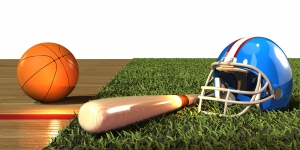All About Concussions
While “concussion” is a fairly common medical term, it’s not something that should ever be taken lightly. A concussion is actually a type of brain injury. Usually, this injury won’t cause permanent damage, but if you suspect you may have one, you should seek medical attention right away.
The most common causes of a concussion are being shaken or hitting your head. Both of these circumstances usually have to be violent or extreme to cause a concussion, but you can’t be too careful when it comes to brain injuries. Learn more about the symptoms of a concussion below, and remember, see a medical professional if you experience the causes of a concussion or any of the symptoms.
 Symptoms of a Concussion
Symptoms of a Concussion
Athletes are at a higher risk of getting concussions. As an athlete, getting banged around, shaken, or even hitting your head may happen often. So it’s even more important for you to pay close attention to how you feel after any trauma to your head.
Here are some symptoms you may experience if you’re suffering from a concussion:
- Headache
- A feeling of pressure in your head
- Passing out briefly
- Feeling dizzy
- Nausea or vomiting
- Hearing a ringing sound
- Tiredness
Remember, these symptoms may not present all at once or right away. They may also last for quite a while after the injury for days or even weeks. If a concussion goes undiagnosed, you may experience memory loss, personality changes, trouble sleeping, sudden sensitivity to noise, light, tastes, and smells, inability to concentrate, or depression.
What to Do Next
If you exhibit any of the symptoms listed above, then you may have a concussion. Stop all physical activity immediately and get help from a medical professional. You’ll need to seek emergency medical care if your symptoms last longer than a few weeks or if you exhibit any of the following symptoms:
- Fever
- Persistent headache
- Stiffness in neck
- Seizures
- Trouble waking up
- Amnesia or general confusion
- Slurred speech
- Delayed reaction time
- Persistent vomiting or changes in vision
Always follow the treatment plan given to you by a medical professional. Some common treatments include getting a lot of rest, both physically and mentally, and frequent breaks from any activities you must do. You may need to ease back into your normal routine to allow the concussion to fully heal.
FastMed Urgent Care provides diagnosis and treatment for concussions and many other sports-related injuries as well as non-life-threatening medical conditions.
Find a FastMed clinic near you right now and get on the path to wellness.
About FastMed
FastMed is a leading provider of high-quality, convenient, affordable, and compassionate healthcare in 34 counties across North Carolina. FastMed serves both urban and rural communities across the state with a wide range of care options, including preventive, telemedicine, occupational health, and primary and urgent care. FastMed is one of the few urgent care providers in the nation that has earned The Joint Commission’s coveted Gold Seal of Approval® for quality, safety, and infection control in ambulatory healthcare. For more information, visit www.fastmed.com.